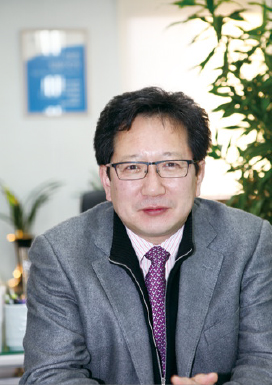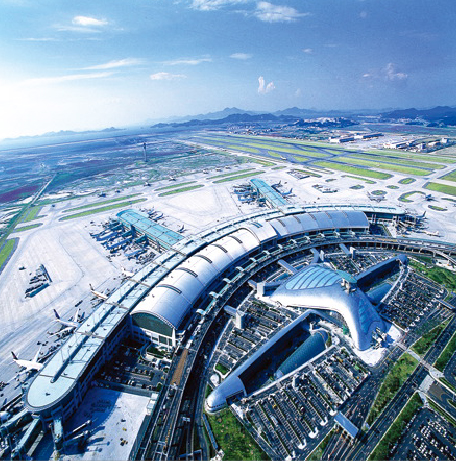Unrivaled Air Hub in N.E. Asia
Dir.-Gen Park Myung-sik pledges support to make Incheon Int'l Airport air traffic hub in the region and development of low-cost carriers


The Ministry of Land, Transport and Maritime Affairs (MLTM) plans to make the Incheon International Airport the unrivaled air traffic hub in Northeast Asia under the third expansion project including the construction of a second passenger terminal as the number of passengers are projected to increase to 62 million annually by 2017. Some 4 trillion won is projected to be invested in the project. The MLTM will also support low-priced airlines to launch flights to countries in Southeast Asia including Cambodia, Thailand, and Vietnam where setting up airlines are free. The ministry will also support the aviation industry to develop various technologies related to aviation such as avionics, satellite aviation systems, IT for control towers at airports, and the localization of control tower communication equipment and other key technologies related to the aviation industry, all under the government strategy to make Korea a strong aviation country.
Following is an exclusive interview with Director-General for Aviation Policy Park Myung-sik of the MLTM.
Question: what is the direction for major aviation policies for this year?
Answer: Korea's aviation industry has developed enough to rank 6th in the world. In line with the upgraded status of the industry, we plan to improve the customer satisfaction levels and build a base for non-transport aviation industrial development this year.
We also plan to reduce the number of delays and flight cancellations through various measures, as there were too many such instances in the past three years. The measures would include the establishment of a system requiring airlines to voluntarily report flight delays and cancellations so that they can be among the subjects in the evaluation of aviation traffic users' service and announce the causes of such incidents in the aviation information portals.
Our ultimate aim is to improve the level of aviation services, especially for the passengers, according to the regulations to be enforced from July this year, following a test evaluation on air passenger service in 2011.
The government will also strengthen the role of Incheon International Airport as a hub airport in Northeast Asia, which won the ASQ top award for a seventh year in a row in 2011, the 8th in international passenger numbers in 2010, and the 2nd in handling international cargoes, in the process of securing its position as a hub airport in the region. This year, too, the airport will continuously expand the aviation network with countries in Africa and Central and South America. We will take measures to expand the European lines and also free aviation with countries in Southeast Asia.
Q: Can you tell our readers the current status of passenger and cargo flights and their prospects?
A: International flights out of Korea carried 42.56 million passengers due to an increase in the number of foreign tourists in Korea, up 6.5 percent YoY in 2011. Despite the European debt crisis, the number of passengers to Europe increased 11 percent from 2010 and those to Japan were down until November last year due to the earthquake, but began to increase from November. The number of passengers on international flights out of Korea continues to rise this year, too.
The number of passengers on domestic flights increased 3.8 percent in 2011 over 2010 at 20.98 million with a huge increase in the number of passengers heading to Jeju Island, while the passengers on other domestic flights decreased due mainly to KTX train service. In the case of air cargoes, cargoes carried out of Korea totaled 3.52 million tons, down 1.9 percent due to a slowdown in the export of chips and IT products. Air cargoes transferred at Korean airports totaled 1.16 million tons, down 1.5 percent YoY. We expect the cargo flights out of Korea will continue to increase this year.
Q: What are some of the plans to further upgrade the international image of Incheon International Airport?
A: The airport has made huge strides, although it was opened only a decade ago in 2001, as one of the top airports in the world in terms of scale and service quality. The airport won the ASQ Award of the Airport Consulting International as the top airport in the world last year for a seventh consecutive year, showing off its international standing, and it was the second largest cargo handling airport and the 12th in terms of number of passengers last year, according to the ICAO announcement.
Japan and China have been taking measures to upgrade their airports to catch up with Incheon, stiffening competition among airports in Asia.
We will continue to strengthen Incheon airport as an air traffic hub in Northeast Asia to further enhance its competitive edge. We will pursue the second expansion project for the airport to be able to handle 62 million passengers annually from the current 44 million, and cargo handling capacity, too, will be expanded from 4.5 million tons to 5.8 million tons per year by 2017. The third expansion project will be pushed without delay, including the construction of a second terminal, parking lot, and the expansion of the cargo terminal.
Efforts will be made to lure more foreign airlines to use Incheon airport, by expanding transfer flight facilities and providing better services through various aviation talks with aviation authorities in countries in Africa, North America, and Europe.
Q: What is the current status of the third construction project for Incheon airport and plans?
A: The project is designed to prepare Incheon airport to be able to handle an increased number of planes, passengers, and cargoes by expanding its major facilities including the backyard facilities under the projection of 7 percent annual increase in the number of passengers and for the airport to be able to compete with its rival airports more comfortably.
The project will require some 4 trillion won in costs as it includes the construction of a second passenger terminal on a par with the existing terminal.
When the project is completed in 2017, Incheon will be able to handle 62 million passengers per year, joining De Gaulle in Paris and Heathrow in London, the only two airports that handle over 50 million passengers per year in the world.
Q: What are plans to strengthen the international competitiveness of the aviation industry in Korea?
A: Korea's aviation industry changed to a two-airline age in 1988 with the launching of Asiana Airlines in addition to Korean Air, and to a multiple aviation age with five small low-priced airlines sprouting up in 2005 increasing competition in many areas among the seven air carriers such service and price, benefitting customers and creating new jobs, boosting Korea to be the 6th aviation nation in terms of the number of airlines and airports.
The direction of major government aviation policy is to ensure fair competition among the airlines through indirect measures. The government is set to provide support to low-priced airlines to open their air routes to such countries as Cambodia, Vietnam, and Thailand, where anyone can operate an airline, and increase the number of flights to other countries where foreign airlines are restricted in their operations. The government will take measures to help Incheon International Airport to set up a flight simulator training center jointly with Lockheed Martin for low-priced airlines to train their pilots.
The government allowed the private sector to develop a small aircraft with seats for two or four persons from design, production, and maintenance and will provide 45 billion won in funds to develop various sectors of the aviation industry in Korea from avionics, airplane maintenance technology, technologies to prevent air accidents, the development of a satellite navigation system, the localization of communication equipment at airport control towers, and the intelligent flight system using IT, unmanned planes and PAV, among others, for sustainable development of the aviation industry in Korea. nw
Director-General for Aviation Policy Park Myung-sik of the MLTM
An aerial view of Incheon Int'l Airport.
3Fl, 292-47, Shindang 6-dong, Chung-gu, Seoul, Korea 100-456
Tel : 82-2-2235-6114 / Fax : 82-2-2235-0799